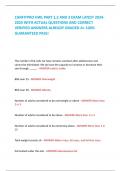CANFITPRO HWL PART 1,2 AND 3 EXAM LATEST 2024-
2025 WITH ACTUAL QUESTIONS AND CORRECT
VERIFIED ANSWERS ALREADY GRADED A+ 100%
GUARANTEED PASS!
The number of fat cells we have remains constant after adolescence and
cannot be eliminated. We do have the capacity to increase or decrease their
size through _____. - ANSWER-caloric intake
BMI over 25 - ANSWER-Overweight
BMI over 30 - ANSWER-Obesity
Number of adults considered to be overweight or obese - ANSWER-More than
2 in 3
Number of adults considered to be obese - ANSWER-More than 1 in 3
Number of adults considered to be extremely obese - ANSWER-More than 1 in
20
Total weight consists of - ANSWER-Water mass, fat mass, and fat-free mass
fat located under the skin - ANSWER-Subcutaneous fat
,Fat that accumulates in areas such as the back of the arms, above each hip
("love handles"), the sides of the back just below the shoulder blades, the
abdomen, the buttocks, and the thighs. Undesirable, but not necessarily
dangerous to health. - ANSWER-Subcutaneous
fat located in the abdominal cavity and around major organs - ANSWER-
Visceral fat
This type of fat is linked to insulin resistance, hypertension, coronary artery
disease, heart disease, certain cancers and diabetes. Significantly influenced by
diet and exercise. - ANSWER-Visceral
condition in which fatty deposits called plaque build up on the inner walls of
the arteries - ANSWER-Atherosclerosis
A person who appears skinny on the outside but is equally at risk as their
heavier counterparts. Risk of death may be higher for these individuals. 1 in 4
slim looking people has pre-diabetes. - ANSWER-Metabolically Obese Normal
Weight (MONW)
Cause of serious risk for insulin resistance - ANSWER-Abdominal fat
the study of food in all forms and how our bodies ingest, digest, metabolize,
mobilize, store, and excrete it. - ANSWER-Nutrition
Benefits of good nutrition - ANSWER-potential resistance to some disease,
weight management, increase physiological vibrancy and psychological health
,The 6 essential nutrients - ANSWER-carbohydrates, proteins, fats, vitamins,
minerals, water
Macronutrients - ANSWER-Water, protein, carbohydrates, fat
Micronutrients - ANSWER-vitamins and minerals
3 concepts required for healthy nutrition - ANSWER-quality, balance, portion
control
knowledge of the anatomy of the digestive system provides - ANSWER-1. an
understanding of the structure of the digestive system
2. an understanding of how food is digested
3. an understanding of how food and toxins can stress the digestive system
The 2 components of the digestive system - ANSWER-The digestive tract and
the accessory organs
an open system through which food passes to be broken down, used, or
excreted - ANSWER-digestive tract
____ connect to the digestive tract and provide some of the critical elements
that allow for the breakdown of food for absorption and/or excretion -
ANSWER-accessory organs of digestion
Anatomy of Digestive Tract - ANSWER-mouth, esophagus, stomach, small
intestine, large intestine, rectum, anus
, Where food enters and digestions begins mechanically through chewing and
chemically with saliva; mainly carbohydrate - ANSWER-Mouth
Links the mouth to the stomach - ANSWER-Esophagus
where food is both mechanically and chemically broken down; primarily
protein - ANSWER-stomach
where food is both mechanically and chemically broken down and then
absorbed into the bloodstream - ANSWER-small intestine
where bacteria continue to breakdown whatever is left of the food and where
water is extracted, forming feces - ANSWER-large intestine
where feces are stored - ANSWER-Rectum
where waste exits the body - ANSWER-anus
Anatomy of Accessory Digestive Organs - ANSWER-salivary glands, liver,
gallbladder, pancreas
glands in the mouth that secrete saliva, which contains enzymes that begin the
breakdown of carbohydrates - ANSWER-salivary glands
The ____ produces bile, used in the breakdown of fat, which is stored in the
gallbladder. It also serves as the major detoxification organ of the body, where
the nutrient rich blood is sent for detoxification prior to use in the body. -
ANSWER-liver




